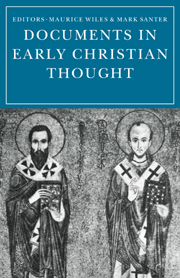11 - FINAL GOAL
Published online by Cambridge University Press: 17 August 2009
Summary
One of the continuing debates of the patristic period was between those who took the biblical prophecies about the end of the present world and the coming of the next as literal predictions and those who took them more or less figuratively. The passage in which Dionysius of Alexandria discussed the interpretation of the Revelation of John (see pp. 145–51 above) provides an example of such controversy in the third century.
The passages in this section all come from the fourth and early fifth centuries. Rufinus provides a conventional and fairly literal exposition of belief in the resurrection of the flesh, and Chrysostom a harsh and uncompromising presentation of belief in the everlasting punishment of the wicked.
Gregory of Nyssa presents a very different picture. In a passage, the presuppositions for which are to be found in his deeply Platonizing view of evil and of the fall (see pp. 101–12 above), he expresses the belief that ultimately all mankind will be united with the divine and evil will be utterly annihilated. All punishment after death is remedial in intent, and the remedy will be effective. The fact that Gregory's views clearly owed much to Origen became a posthumous embarrassment to his memory when Origen's universalism, along with much else of his most characteristic teaching, came to be condemned as heretical.
Predictions of the imminent end of the world have been another recurrent source of dispute throughout Christian history.
- Type
- Chapter
- Information
- Documents in Early Christian Thought , pp. 245 - 270Publisher: Cambridge University PressPrint publication year: 1975



